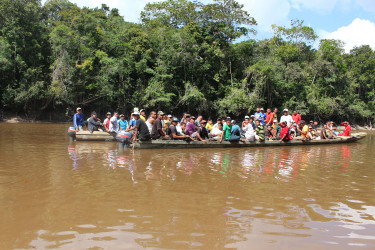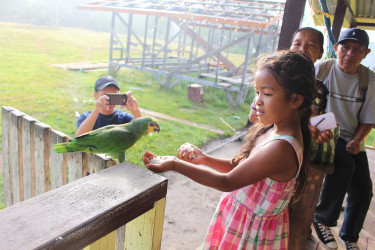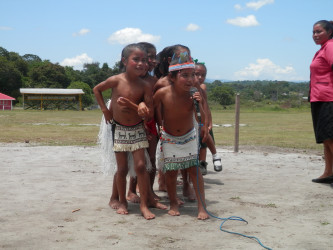“Is tiger! Is tiger!” the man shouted, and, despite admonitions to sit, I rose up in the huge canoe again, quivering with excitement trying to get a shot of the “tiger.”
The animal, its brown head almost camouflaged by the brown waters of the Mazaruni River, finally reached shore and with one quick bound, disappeared into the thick jungle. “Is tiger,” the man said, his disappointment evident, as initially, they thought it was a deer.

I barely got a shot of the animal, which to me seemed to be either a jaguarundi or a cougar. It was lucky that it wasn’t a deer or else it would have been lunch.
The two-hour long canoe ride was otherwise uneventful and I had been deep in thought as we moved down the polluted Mazaruni.
This was my second visit to Jawalla, an indigenous village populated by people of the Akawaio nation, deep in the jungle of the Upper Mazaruni and accessible only by boat. To get there, I flew from Ogle to Kamarang, then up the Mazaruni River in a long canoe cut from a single huge tree. It was powered by an engine. It was named ‘Luckey Dollar’ with an ‘e’ but we nicknamed it the Ark because it was filled with people and slow. We took over three hours to get to Jawalla under a blazing sun. In a speedboat, the trip would normally take just about an hour.
I had the first indication that the trip was going to be different when we met another enormous canoe, moving even slower than we were, heading downriver. It was filled with dozens of men, women and even children.
The people in both canoes hailed each other and before I knew it, the canoes were in the middle of the river, side-by-side, while the people hugged and shouted news. It was all about Venezuela and guns. News, letters and newspapers were exchanged and the people quickly pounced on the newspapers eager to read about what was happening.
They were also quick to share their tuma pot, a traditional dish, where meat is cooked in cassava broth with lots and lots of pepper. As the meat finishes, more and different kinds of meat are added to the pot ensuring it lasts for days. I had a piece of cassava dipped in the tumapot. It was blazing hot so after bowls of casak, a local drink were being passed around, I quickly grabbed one and gulped. Far be it from me to be the only one with tears in my eyes while everyone else was enjoying the tuma.


It turned out that the people in the other boat had travelled two days from Phillipai, heading to Kamarang to surrender their guns under the amnesty. I do not know Akawaio so I could not follow the conversation but when they spoke English, it seemed that there was a lot of confusion about what the amnesty really was about.
In subsequent conversations with other villagers, it seemed that the villager leaders had communicated the news about the amnesty to the people. They were warned that if they did not turn in their guns, after the amnesty ended, if they were caught, they were going to be fined “$1 million” and locked up for years.
Many were afraid. “I don’t want to get lock up, I going and surrender my gun,” one man told me. With no exception, all said over and over, that the guns were not used to commit crimes, that they were to protect crops and poultry from wild animals and to hunt to provide for their families. Their guns were all shotguns. Some had the same guns in their family for years. One man noted that it was easier to get meat with shotguns as compared to bows and arrows.
But it was when I spoke to the women that I truly understood the feelings of the people. I had gone there with an abstract notion of what it meant to turn in a gun, and quite frankly, it seemed to be a good thing.
The women had quite different and passionate views about the matter. It was a matter of livelihood, they said. Their husbands and sons hunted to put meat on the table, to sell the meat so they could buy items for their children in school. There were no jobs, there were no markets, the forest was their market, they said. I had been walking around a bit and knew that while there were some well-off people in the village as a result of gold mining, many were very poor.
An elderly woman, and another younger one, spoke in Akawaio and while I waited for it to be translated, I knew how passionate they were about the matter, one saddened, the other angry and almost in tears. One man told me he had cried. Another woman said the same.
In a place where a pound of fish cost $1200, a pound of chicken $1500 if not more and wild meat can cost more: one woman told a story of powis being sold for $3500 a pound, hunting was not only to put food on the table but to get some money as well.
I never quite considered it that way but when one woman spoke of using the money to get supplies for her child at school, then I finally understood the depth of their feeling.
Having been in journalism for several years now, I sometimes think I have gotten jaded but there I was, saddened and angry that policymakers a world away were making decisions that impacted the way of life of people in ways that they probably never thought of.
It was not that the people had never applied for gun licences before. Some had. One man showed me his letter of acknowledgement from 1996 that even now, he still keeps and walked with to the Kamarang police station. There were requirements that some of the people cannot fulfill, travel back and forth is expensive, and some never got a response.
The police at Kamarang had also misled the people by telling them that their applications would be given priority and as dozens filled applications, several approached me and asked me if it was true. Having heard nothing of the sort, I said that I did not believe it to be so.
The police also recorded names of the people who turned in shotguns. I subsequently spoke to Minister of Public Security Khemraj Ramjattan who said that the police were not supposed to record names and also that their applications would not be given priority. Some of the people wondered where Minister of Indigenous Peoples Affairs Sydney Allicock was in all this. If he reads this, he should know that the current theory is that he and his staff were too busy celebrating Indigenous Heritage Month instead of looking at real issues. While I would like to say that I differed, I had interacted with a senior member of his staff on an issue and he tried to ‘spin’ his way away from my questions. However, when I referenced an issue, his response was the total opposite of what the matter was about. I let him ramble on and then pointed out that what he had said was nothing like the actual case. But I digress.
I would like to write more about the trip, the two huge canoes and a man in a tiny wood skin canoe who raced to an acouri swimming across the Mazaruni. The man got there first and after a few minutes spent wrestling the acouri, clubbed it to death. Two women, his wife and daughter, I think, came in another wood skin canoe to collect the carcass. Lunch, I think.
I would like to describe shooting up the rapids, and then holding on for dear life as the boat almost capsized not once, not twice, not thrice but four times as the engine failed and we bumped from rock to rock while I clung to the rocking boat, trying to keep from falling into the water that seemed ready to grab at me. There was a place called Abbou where only two families lived with three new babies in the home, far from anywhere but benefitting from strong cellphone signals.
On the night of the blood moon, the people abruptly stopped their heritage celebrations because the older ones said it was a sign of the apocalypse.
I would like to write more about the experience of Jawalla and the pursuit of the “tiger.” But every time I think about it, I see the old woman and the younger woman, one saddened, one angry and passionate, both fearful talking about the meat they got from hunting, not only for eating but to support their children in school.
“Can’t hunt for lil food now,” one man told me after turning in his shotgun. Even though the boat had 12 shotguns, they did not shoot the “tiger.” It was not food so they let it go.




